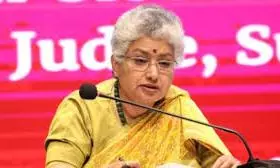
Justices Nagarathna and Dhulia disagree with critique of Krishna Iyer’s doctrine in recent property rights judgment
text_fieldsIn a recent Supreme Court judgment on property rights, Justices B.V. Nagarathna and Sudhanshu Dhulia expressed strong reservations about the majority’s critique of the judicial approach of former Justice V.R. Krishna Iyer.
Although Justice Nagarathna agreed with the majority decision that not all private property qualifies as “material resources of the community” under Article 39(b) of the Constitution, she criticized the majority’s disapproval of the Krishna Iyer Doctrine, which promotes state control over resources for the community’s benefit.
Justice Nagarathna noted that it was “unwarranted” to label Krishna Iyer’s approach as a “doctrinal error” for advancing a theory centered on state control over private resources. She argued that this interpretation fails to appreciate the historical and socio-economic context in which Iyer delivered his judgments. Justice Nagarathna stressed that the majority’s perspective risks misinterpreting past rulings by judging them outside of the circumstances that existed at the time, including the economic policies before India’s 1991 reforms, reported The Indian Express.
Justice Dhulia, delivering a dissenting opinion, also objected to the criticism of the Krishna Iyer Doctrine and emphasized its continued relevance and value in contemporary jurisprudence. He argued that the inclusive interpretation of “material resources of the community” adopted by Justices Iyer and O. Chinnappa Reddy still holds significant jurisprudential worth. According to Dhulia, restricting this interpretation limits legislative flexibility in determining which resources serve the community’s interests.
Dhulia underlined that the directive principles of state policy should be actively pursued by the legislature to realize the vision of an equitable society envisioned by India’s freedom fighters. He invoked the Constituent Assembly debates, affirming that privately owned resources are indeed part of the “material resources of the community” as outlined in Article 39(b). Furthermore, he emphasized that the legislature has the authority to decide the distribution and control of resources, subject to judicial review.
In his dissent, Justice Dhulia defended the Krishna Iyer and O. Chinnappa Reddy Doctrines as fundamentally grounded in humanistic principles of equity and fairness, viewing these doctrines as a guiding light in difficult times. Their judgments, he noted, reflected not only intellectual acumen but also empathy, as human welfare was central to their legal philosophy.























